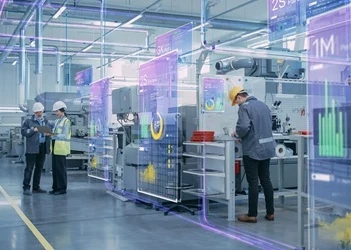Value Creation: Yorkshire Water’s Head of Data Services Stephen Herndholfer on Big Data & Analytics for Utilities
Add bookmark
|
In this exclusive interview Stephen Herndlhofer, Head of Data Services for Yorkshire Water, speaks about trends, opportunities and predictions for big data in utilities ahead of the Big Data and Analytics for Utilities Conference. Please note: this transcript has been edited for readability. What recent trends have you witnessed in big data in utilities in the last few years? S Herndholfer: From my perspective, the most significant change is the developing capability to hold large and disparate data sets in a single location. It has allowed us to access and analyse them in more interconnected and integrated ways. |
For Yorkshire Water, this is the case for much of the telemetry data that we hold on our assets. For example, the ability to relate that telemetry information to other contextual data, such as observed meteorological data, helps us understand the performance of our assets in relation to events such as weather events that affect those assets. That’s been very beneficial in understanding how we manage the risk of severe weather.
What big data benefits can companies get from predictive analytics?
S Herndholfer: For a company like Yorkshire Water, one of the key shocks that we experience as a business is around things like weather. If we can manage those events better it helps us control our costs more effectively. So, as a general rule, I would say that when it comes to benefits, it’s all about either creating value or protecting value.
The insight derived from analysis of any data has got to focus on key business risks or opportunities and the creation of insight to support better decisions, be they operational decisions - such as managing something like a sudden frost- or longer-term investment decisions. These decisions have got to be supported by insight. The creation of insight-driven decisions helps us manage costs and realise longer-term opportunities, such as deregulation of markets, and manage our risks more effectively to prevent avoidable cost. It’s all about creating and protecting value.
You have spoken at length about value. What do you want most from big data?
S Herndholfer: It is about value creation. If we look at the data itself, for me it’s moving analytics and hindsight reporting into foresight reporting so that we create a predictive tool rather than the retrospective analysis.
I’m a strong believer in the fact that past performance is no indicator of future performance. A challenge for us is ensuring that the data we collect or procure externally is of direct relevance to the challenges we face as an organisation and are seeking to address. That isn’t necessarily the same data that we’ve always collected - it’s a change of emphasis to being more future-focused in our analytic capability.
You’ve spoken about the benefits and opportunities, but what do you see as the challenges to implementing big data, particularly in utilities?
S Herndholfer: My main experience is internal for Yorkshire Water; without being too critical of our senior leaders, I think the main challenge we have is cultural. When you look at decision-making processes - and I don’t think we’re too dissimilar to many organisations in this respect - I think we’ve relied very heavily on experiential-based decision-making. Big data is not about transitioning entirely to a more analytical approach. it’s about ensuring that we have a balanced approach and we show due deference to experience and knowledge and that aspect of decision support.
Sometimes good decisions are very correct. But I do think that we need to give over more to a more analytical approach and take account of the plethora of analytical tools that are out there now and make sure that we apply them and make use of the insight and trends that are created to analysis.
It’s not necessarily about predicting the future absolutely accurately – nobody can do that. But it is about making the best available decision, based on the knowledge that’s available to us at any one time and not purely basing it on, experience that is derived from times and experiences that are no longer as relevant as they will be in the future. It’s about striking the right balance between analytic decision-making and experiential-based decision-making. So, I think that’s big challenge for us as an organisation.
What are your predictions for data volumes over the next three years?
S Herndholfer: I think they will undoubtedly grow. We’ve seen a massive rise in data volumes in recent years, and I don’t see any change in that. We’re already struggling with sort of the amount of data that we’re collecting and struggling with the process of making sense of that data.
The real challenge here will be to constrain the amount of data that we generate and really understand our data dependency in relation to the questions that we’re seeking to answer. So we need to focus on collecting the data that is relevant to the organisational objectives.
The phrase "data rich, information poor" has been bandied around for many years. It’s often a phrase that’s used in Yorkshire Water. We’re not any different to many organisations in this respect, but I think for us, a key challenge will be one of rationalisation and focus and making sure that we’re collecting the data that is relevant to the decisions and the questions that we’re seeking to answer.
Many industries are already utilising big data; which industry or industries do you think utilities can learn lessons from?
S Herndholfer: The industry that leads the way in this arena is telecoms. They’re doing that because they have a wealth of opportunity to capture rich information which is very relevant to their customers, so they can quickly analyse usage trends and preferences to their products.
The utility sector is different. You could argue that Yorkshire Water, like many utilities, is a monopoly provider. We don’t necessarily have to capture large amounts of customer data. But we’re moving into an arena now - with our imminent price review where our customers are having to sign off our investment proposals for the next five years and approve our plans - we need to get greater and great insight into our customers’ preferences for how we manage our service and how we ensure the integrity of that service for many years to come. Understanding customer preference is key, so I’d like to get a bit of insight out of there, certainly the telecoms industry, amongst others, that use customer data well. And I think it’s an area that, from a utility perspective, is something that we’ve not given due consideration to in previous years.
I understand you’re going to be speaking at the inaugural Big Data and Analytics for Utilities Summit, taking place the 3rd - 5th of December in London. What are you most looking forward to about the event?
S Herndholfer: I don’t go to many conferences, and I don’t speak at many conferences. So when I do select a conference to go to and certainly speak at, I do want to make sure that it’s going to create value for myself. And my experience of similar events in the past, I’ve found that it’s really helped me test my own thinking, speaking to experts and practitioners in a related or relevant field, and also to learn new methodologies. I fully expect this event to be no different in that respect, so I’m really looking forward to a very rich learning experience.
[inlinead]






















